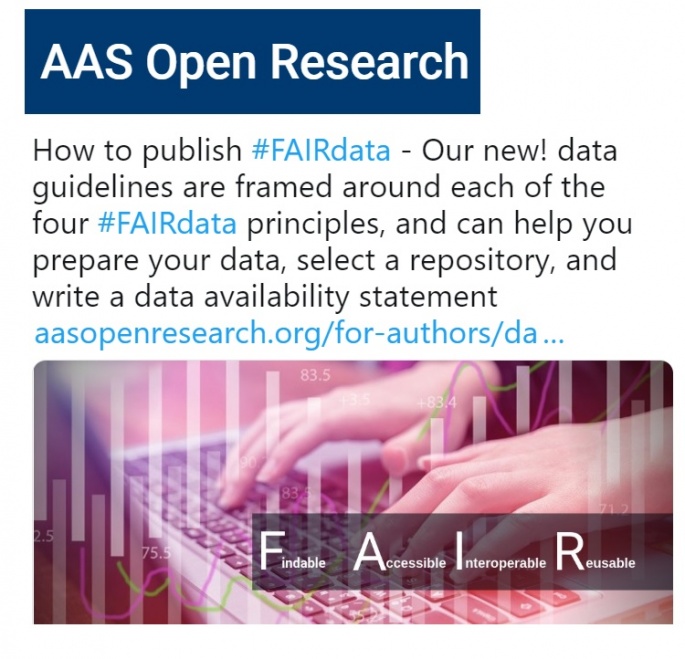AAS Open Research: Open-Access publishing platform for African scientists
27/11/2018


"AAS Open Research represents the cutting edge of science communication by offering the option to communicate research in a manner that is immediate and accessible...The content of AAS Open Research at its introduction features an abundance of quality research which we hope will advance the thinking and research approaches of colleagues globally...
|
...I invite you to join us in transforming the communication of African science to a system that is immediate, transparent, participatory and dynamic, which serves the needs of African science and African scientists", - Putting African researchers at the centre of the publication process, by N.Torto, AAS Open Research Blog. |
In 2018 Africa’s academy of science AAS launched an open-access publishing platform - AAS Open Research - the first of its kind aimed exclusively at scientists on the African continent. Although there are already open-access publishers that focus on Africa, such as AOSIS Publishing (based in South Africa) AAS Open Research will be the first to adopt open peer review.
The AAS Open Research platfrorm will initially take submissions only from AAS fellows and affiliates (who together number around 400), as well as researchers funded through programmes managed by the Alliance for Accelerating Excellence in Africa. The Nairobi-based body manages grants for African research programmes that come from international funders, mostly targeting health research but also areas such as climate change.
The AAS Open Research platform:
- has been created with the London-based open-access publisher F1000, adopting the model of its F1000Research publishing platform;
- publishes articles, research protocols, data sets and code, usually within days of submission and before peer review. F1000 staff arranges post-publication peer review: the reviews and the names of their authors are published alongside the papers. The papers are indexed in abstract databases such as PubMed only after they pass review;
- cuts the time and effort scientists have to put into finding homes for their work, and makes the review process more transparent;
- follows AAS Open Research FAIR Data Prnciples
HOW DOES AAS OPEN RESEARCH WORK & more information on Submission & Browsing is HERE
P.S. "One common criticism of the open access and open science movements is that they tend to take a standardised view of science and scholarship, and so propose one-size-fits-all approaches when advocating for ways of making research and the research process more open and transparent. This often poses significant challenges for, for instance, researchers in non-STEM disciplines. It is also often deeply problematic for those based in the global South", - The OA Interviews: Arul George Scaria.

RELATED:
F1000Research: OKAD: Open Knowledge in Agriculture Development
AGORA (Access to Global Online Research in Agriculture)
AGRIS : the International System for Agricultural Science and Technology providing access to bibliographic information on agricultural science and technology
- The OA Interviews: Frances Pinter (Open and Shut)
- The Vienna Declaration on the European Open Science Cloud (Vienna, 23 November 2018)
- LIBER A Vision for Open Science (LIBER)
- Why do Open Science & Incentivizing Data Sharing matter? Visit the African Open Science Platform to learn more
- The African Open Science Platform (AOSP): The Future of Science and the Science of the Future
- Open Access Publishing Solutions for Librarians (Recorded Webinar)
- Gates Open Research: accelerating access to research products
- What are repositories? (OpenAIRE)
- Platform for Big Data in Agriculture : to Organize, Convene, Inspire
- Make FAIR your Datasets using Springer Nature RESEARCH DATA SUPPORT
- Deposit your research data as FAIR Data with help of REPOSITORY FINDER!
- Find the DATA You need ... more easily with Google Dataset Search!
- Unfold Open Data with APERTIO
- Registries for Open Data Repositories, Institutional Repositories, Policies, Journals
- You can download 440+ publications, studies and information products free of charge from the WIPO website. View what’s available here
- Open Access Week, 22-28 October 2018, Globally
.jpg)
- When does peer review make no damn sense?
- A multi-disciplinary perspective on emergent and future innovations in peer review (F1000Research)

Follow @AIMS_Community on Twitter... And, thanks again for your interest!
